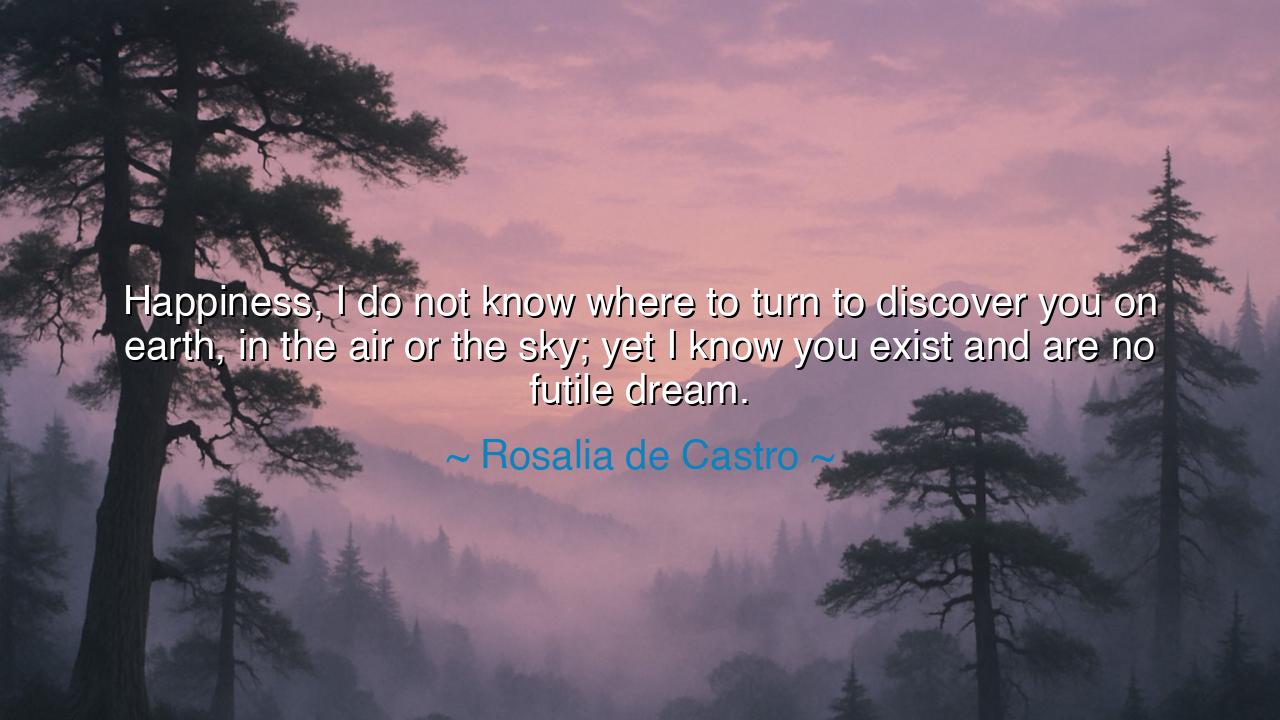
Happiness, I do not know where to turn to discover you on earth
Happiness, I do not know where to turn to discover you on earth, in the air or the sky; yet I know you exist and are no futile dream.






Hear the longing voice of Rosalía de Castro, poet of sorrow and light, who once cried out: “Happiness, I do not know where to turn to discover you — on earth, in the air, or in the sky; yet I know you exist and are no futile dream.” In these words lives the eternal struggle of the human spirit — the search for joy amid the transience of the world. Hers is the voice of every soul that has wandered through despair yet refused to surrender hope. Though she could not find happiness, she believed in its reality — unseen, perhaps unreachable, but true. Such faith, born from darkness, is the noblest kind of light.
The origin of this quote lies in the heart of Rosalía de Castro, a 19th-century poet from Galicia, Spain — a woman who wrote in a time when sorrow clung to the land and melancholy seemed the language of the soul. She lived through loss, poverty, and the loneliness of being misunderstood, yet her spirit refused to yield to bitterness. Her poems — tender, aching, luminous — speak of the human condition: the ceaseless yearning for meaning and the fragile hope that life, despite its suffering, still conceals beauty. This line, drawn from her reflections on existence, captures that paradox — the endless search for happiness, and the unbroken conviction that it is real, even if hidden from mortal sight.
The ancients, too, wrestled with this same mystery. Aristotle spoke of eudaimonia — the deep fulfillment of living in harmony with virtue, not the fleeting pleasure of moments. Boethius, in his prison cell, wrote that true joy is unchanging and divine, not found in wealth or power, but in the steadfastness of the soul. Even Buddha, walking upon the path of enlightenment, taught that happiness is not a place one finds, but a state one awakens to when desire and fear are silenced. So too does Rosalía’s lament echo across centuries — for she seeks not mere comfort, but that higher joy that transcends circumstance.
Her words reveal a sacred truth: that happiness is not lost, only hidden behind the veil of perception. Many wander through life believing that joy is something to be found outside themselves — in possessions, in love, in fame, or in victory. But all these are shadows, passing as clouds over the heart. When they fade, sorrow returns, and the soul feels empty once more. Yet Rosalía, with her poet’s intuition, senses something deeper — that happiness, though unseen, is not a lie. It exists, not as a reward, but as a presence that must be discovered through understanding, compassion, and the courage to keep believing even when the world seems barren.
Consider, for a moment, the story of Helen Keller, who, though born blind and deaf, found radiance in life through perseverance and faith. She, too, could have cried as Rosalía did: “I do not know where to turn to find you, happiness.” Yet through the patient love of her teacher, she discovered joy not in sight or sound, but in meaning. “Everything has its wonders,” she wrote, “and even darkness and silence have their gifts.” She proved, as Rosalía believed, that happiness is no “futile dream,” but a truth that reveals itself to the heart that continues to seek.
And yet, there is something profoundly human in Rosalía’s admission that she does not know where happiness hides — on earth, in the air, or in the sky. It is the confession of every soul that has looked outward, then inward, and found no lasting peace. For happiness cannot be possessed, only experienced; it is like sunlight on water — one cannot seize it, only bask in its warmth for as long as it shines. The wise do not chase it across the world; they create the stillness in which it appears. To those who despair, Rosalía’s words are a reminder that not finding happiness does not mean it does not exist. The very act of seeking it with sincerity is already a form of faith.
So take this, O listener, as the lesson of her song: happiness is not found by grasping, but by awakening; not by fleeing sorrow, but by embracing the fullness of life. Do not curse the longing in your heart, for it is the compass pointing toward truth. When you look for joy, look not only to the earth, nor to the sky, but to the quiet center within you — where gratitude lives, and kindness dwells, and the spirit whispers of eternity.
Thus, the wisdom of Rosalía de Castro becomes both a lament and a promise: though we walk through uncertainty, though we search and stumble, happiness is no illusion. It is the pulse of existence itself — elusive, yet ever near, waiting for the heart that believes. Seek it not with greed, but with wonder. Cherish it when it comes, trust it when it hides, and know, as she knew, that even amid sorrow and doubt, happiness endures — not as a dream, but as the hidden truth of every living soul.






AAdministratorAdministrator
Welcome, honored guests. Please leave a comment, we will respond soon